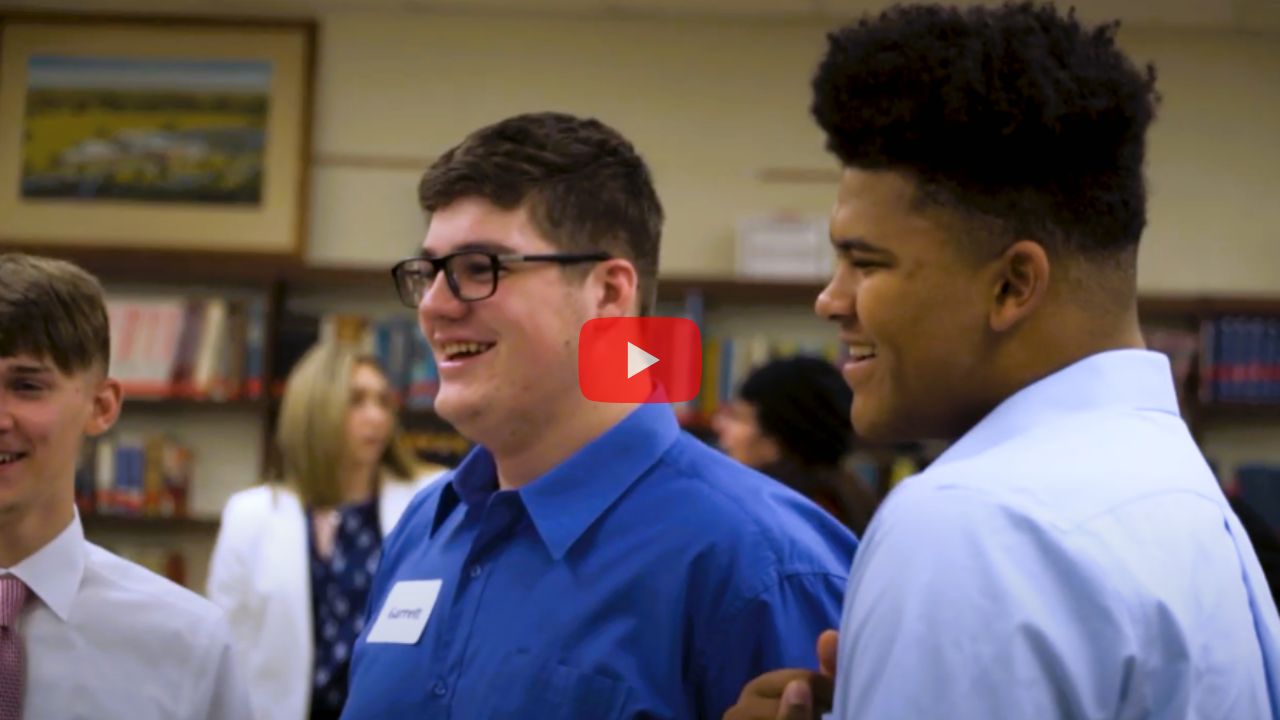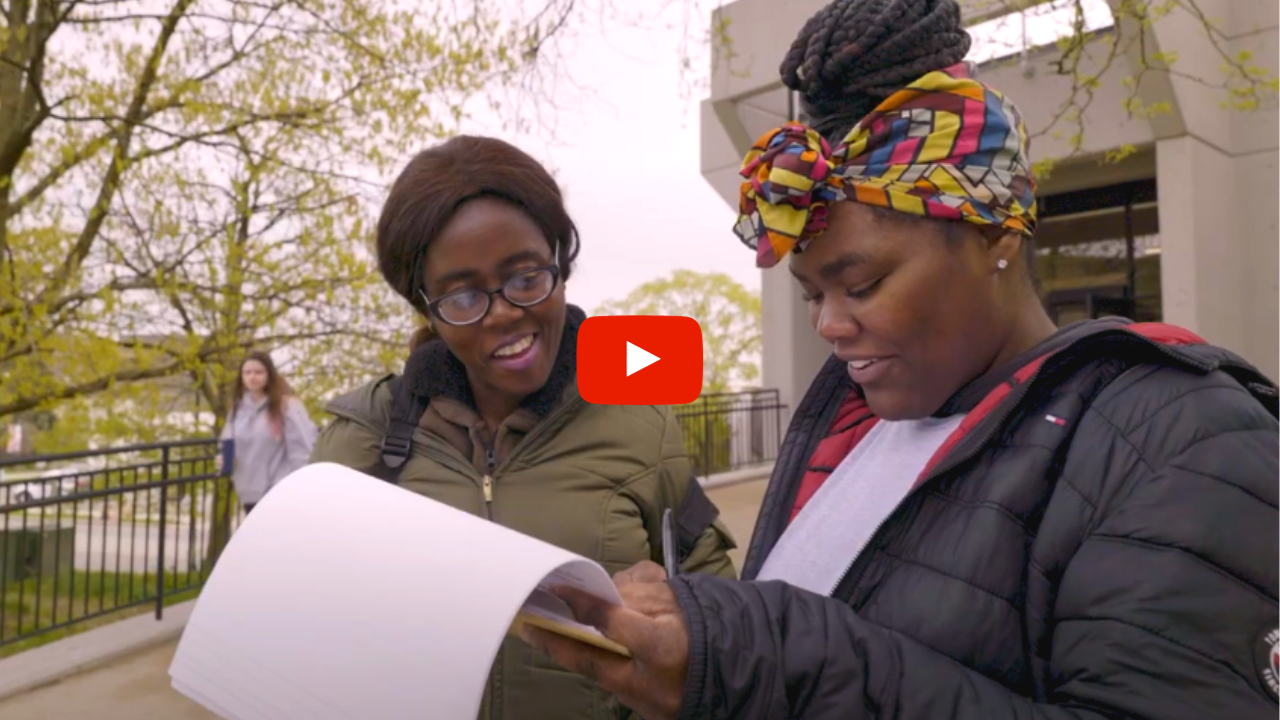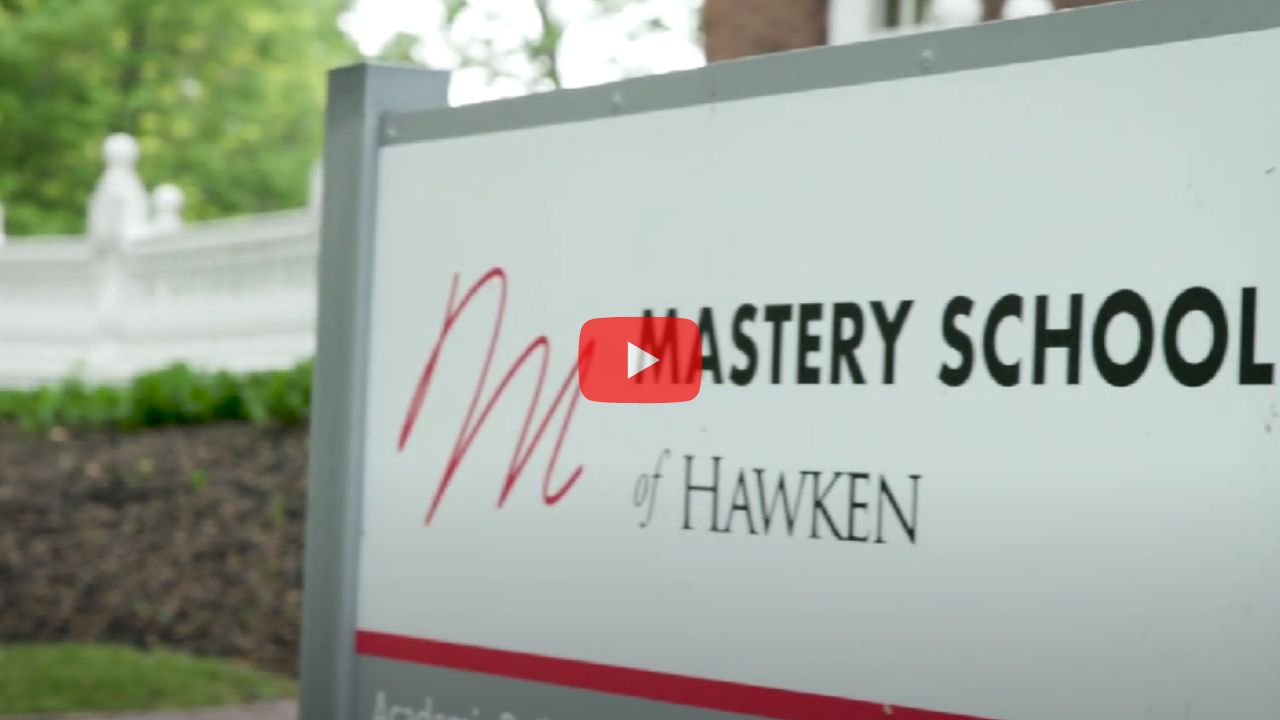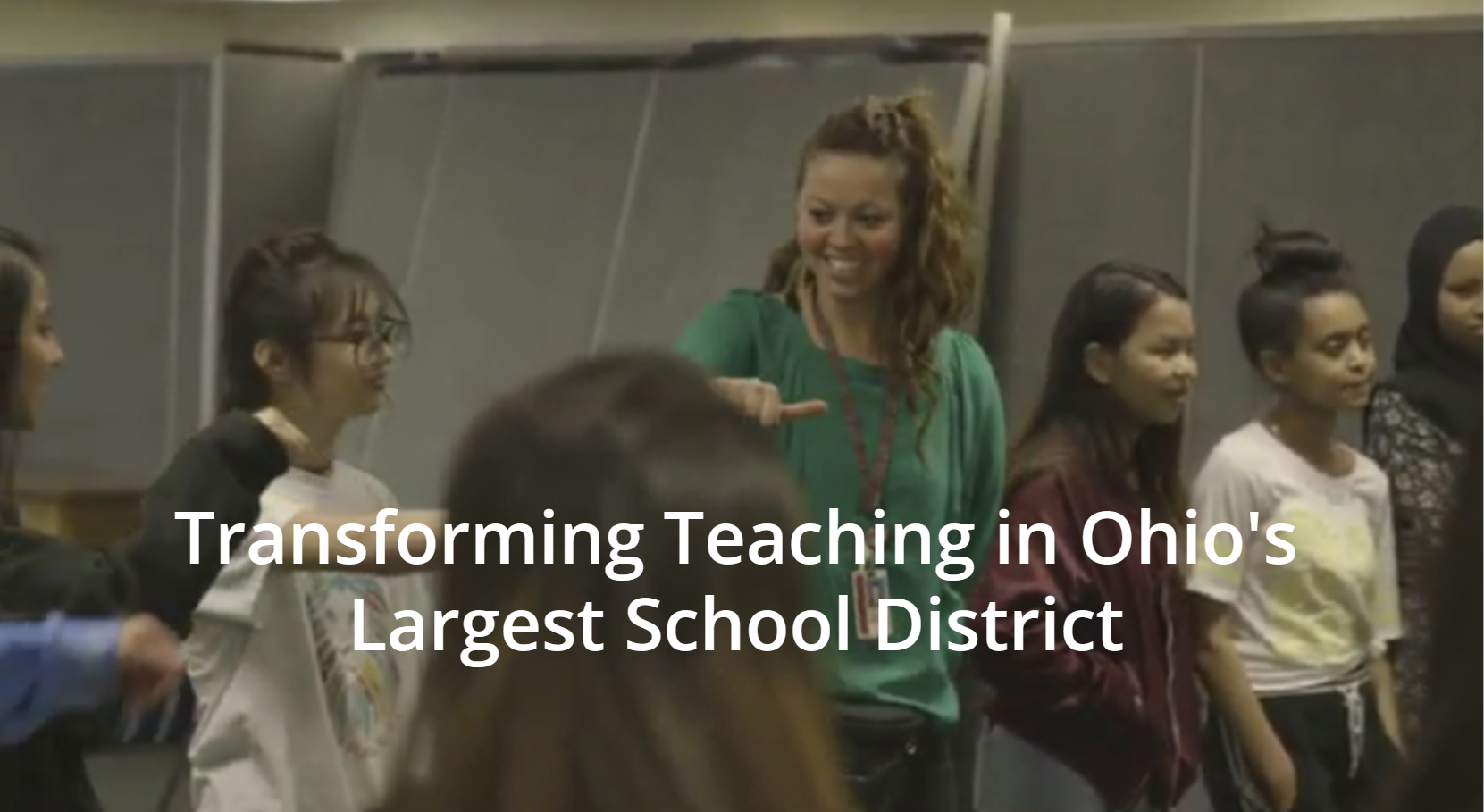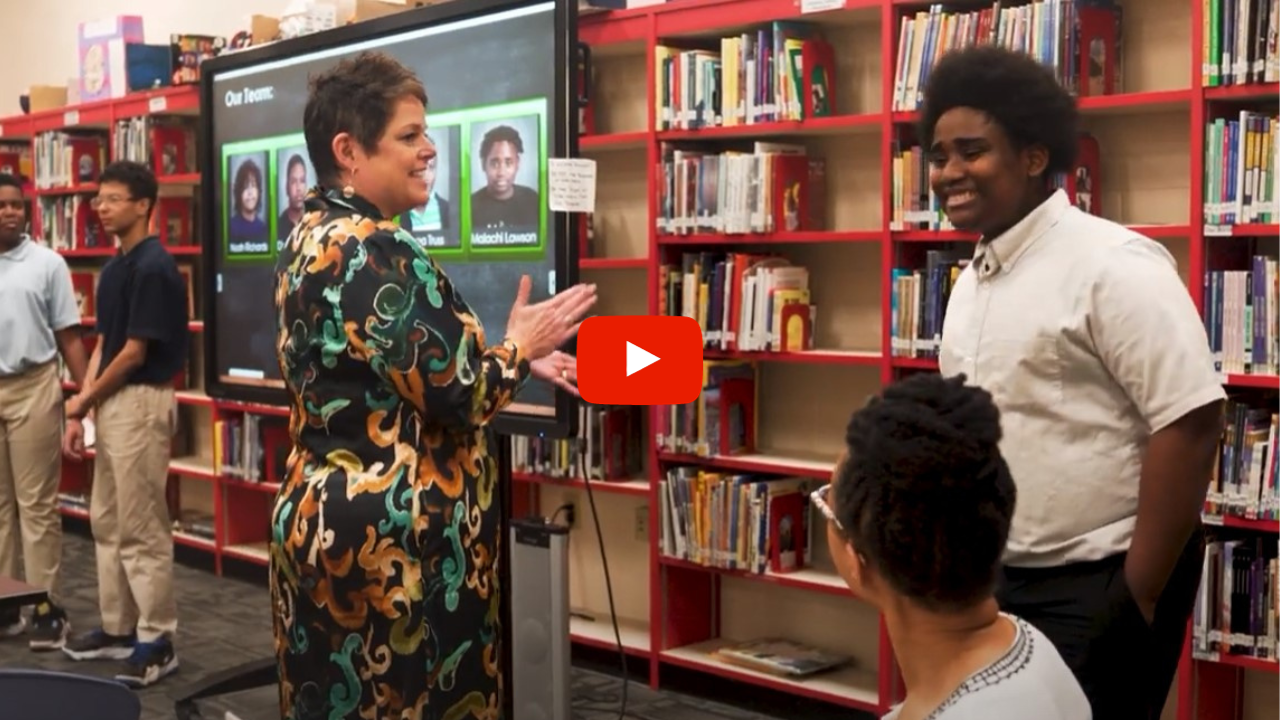In this episode, Alison shares how the Korda Method of teaching and learning deepened her understanding of innovative teaching practices, pushing students towards rigorous and meaningful learning.
Alison: So Tim, we’ve been at this now for about six months, which is wild to think about. But…
Tim: This crazy podcasting thing we’re doing.
Alison: Yes, indeed. Do you have any updates to share or where we’re at, what are we doing here?
Tim: Yeah, we haven’t talked a lot about the podcast itself. We haven’t gotten very meta on the podcast. But I think it’s safe to say our team here is pretty excited about what’s happening. We’ve seen tens of thousands of downloads since February. We know a lot of people care about this and we’re really committed to helping change the way education works, and to fix it. And so it’s really been encouraging to see the ears, I was gonna say see the eyeballs on it, but it’s really the ears. And so we wanna kind of…we’re always trying new stuff, we’re always trying to improve, and so based on that, we realized it’s probably a good time to start some ways to really engage people.
And we’re gonna try a Facebook group, and we’ll start that, and we’ll put a direct link to it in the show notes. So if you’re listening in the car, you can just click on it and ask to join and we’ll approve you in. It’s gonna be a public group, so anyone can come in. There’s no requirements or fees or anything like that. And hopefully, it’s gonna be a place where we can start to interact with listeners directly, and listener to listener, and a bunch of other people we’re going to invite in, and really just start building that community. And we’ll try it out and see if it works. We don’t know if people will engage, but we’ve a pretty good hunch they might. So that’s where we’re gonna start.
Alison: Well, I think we’re also anxious to learn more from the listeners. To really understand who it is that’s interested in what we’re doing, and encouraged by this movement, I know that we are. To see there have been so many listens, I think, really gives us continued momentum to move this forward, and to create a community, and start those conversations because this is an important issue that a lot of us care about. So the more we can engage together, I think might be better.
Tim: Yeah, I think it’s gonna be really important for us because when we started this podcast in February, we really didn’t know who was gonna listen, if anyone was gonna listen, and so we crafted episodes around what we thought people would wanna hear. And so now we’re sort of in a phase where we want to invite more feedback, we want to know what you want to know about, and what we can provide, and so even in our own planning for future episodes, I think this Facebook group’s gonna be really valuable. And inviting everyone in, so hopefully you guys can come on in, check it out.
Alison: Great.
Tim: So, you ready to reflect a little bit today?
Alison: Yeah, in fact, we’re gonna see reflecting, reflecting on the podcast and how that’s gone this past six months, a little bit more about reflection, summer time, good time to reflect.
Tim: Yeah, we’re recording this towards the middle of August and we’re already thinking about our next crew of students that are coming in, and we’re also…well, you’ve also gone through a full 12-month cycle of this nuttiness. So now, you’re now to the point where you’re gonna be doing things for the second time. And so nothing will be new to you and we thought this was a good moment to crack that experience open and have you talk a little bit about what it’s been like, and what you’ve learned, and what you’ve discovered, and just any thoughts you have on it.
Alison: No, that’s hopeful. And I have a hunch, knowing you and Doris, that there will be plenty of new things that come up that I will have to learn. This is a continual learning experience. But it’s great to spend the time, I think, reflecting and thinking back through the year. And I’ve done a bit of journaling myself this summer and had some conversations with good friends, to recognize the amount of growth I’ve had on a personal and professional level, that has been so intense. I mean, it really has felt in a lot of ways like it’s been 10 years that I’ve been working with you guys, because of the amount of growth and intensity at which I was learning this year. Really thinking about where I came from, that I wasn’t in the education system as a teacher prior to working with you guys this year. I had a lot to learn, in general, about schools.
Tim: And you really didn’t wanna be a teacher, either, right?
Alison: Fair. Great point. There was a little bit of convincing that happened to get me into this team. But to be honest, it’s been a hell of a year. I’ve learned so much. With regards to what I had been doing previously, where I was working with entrepreneurs in Latin America, in the Caribbean, and really thoughtful about how we were helping to scale their work, and to provide access to resources that they didn’t have. Whether that was Mayan women who were selling water filters, solar lamps, and eye glasses, in rural areas of Guatemala, or if that was working to build more sustainable and scalable models for entrepreneurs in agribusinesses or tech businesses in Jamaica.
And I continued to do that work, then when I came home and was really recognizing the value of immersing people in the entrepreneurial experience of bringing ideas into reality, really how empowering that can be for someone to recognize the skills they have, the strengths they have to add value to the world around them, and had been doing these one-off workshops for girls in high school and college whether that was a weekend workshop, summer camp, that kind of a model. And given my own experience, I mean, in college I had studied entrepreneurship, social entrepreneurship specifically, and I had been on a team of students that cofounded a social enterprise, and had my own kind of immersion into this work as a student, and then given the experiences I had…I felt like I was creating experiences in these workshops that I had when I was running my own business, that were great for women and girls to really learn more about themselves and how they could create value in the world and make an impact somewhere.
But given where I am today, to look back at this past year and recognize how much deeper I’ve gotten in that work because of the guidance I’ve had here, really under Doris’s mentorship which allowed me to really understand how to create transformational learning environments for the next generation, in very specific ways. There was a lot of nuance in there that…I mean, as I was running my own, one-woman startup, I didn’t have the opportunity to go so deep, when I was also trying to manage the other sides of the work. But to have the opportunity here where…I was obviously interested in learning, but to have a team of people, you and Doris also focused on my growth and so intently, every day helping me get deeper into it, where there was conversations of reflections, how could we have done this differently? Or you spending the time to really sit down and talk me through the craziness of grading a class like this, or grading in general, and all of the elements that allowed me to start to understand how to do this in a different way that was really rich, that was really meaningful for students.
And it was during their school day too, which was different from what I had been doing before. So, from a high-level, the amount of growth I was able to go through to deepen my practice and knowing that my bigger mission in life really, I feel is to continually shape this next generation of change makers to go out there and solve problems in the world. And that…I think I joked with you and Doris in the past about feeling like I’m gaining a master’s right now in this Korda methodology that she developed over 20 years of her academic career. And has allowed me to develop more strategies and practices, that really move a needle for a lot of our students and that’s wild to watch.
Tim: Well, that’s an interesting idea that I wanna ask you a little more about because I think the common perception from people from the outside is that, well, you just kinda throw the problem in the room, and then you walk away and see what the kids do, and then you come back later. And it’s sort of, a really hands off approach…
Alison: Not at all.
Tim: Not at all, right? So can you talk about that then?
Alison: Sure. That’s a great point you make. Because the work we do is highly experiential. It is intended that the students are the ones navigating that experience, that it’s immersive. They’re the ones that are in it. But that’s not to say we as the facilitators, teachers, instructors, guide, whatever word you wanna use, doesn’t mean that we then sit casually by the side and just allow that to happen in a siloed environment. It requires a lot of work and a lot of prep. And at kind of a granular level, what that breaks down to, is, for example, the assignments, the timing which the assignments happen and how much time Doris spent with me to really train-up on the depth of content that these students need to get into when they’re solving a challenge isn’t, “Hey, you know, we did this last semester. Let’s just find her a lesson plan and throw that into the classroom, and see how it works this semester.”
Because of the way this course is designed, and we have different challenges every three weeks really, for the students, but they’re also very different challenges than they were from the previous semester, there really isn’t the opportunity to completely replicate the same assignments over and over again. Which I love actually, because it’s very dynamic, and as a learner myself, it requires me to be equally engaged in the challenges students are working on. So for example, if they’re working on the dental insurance challenge, I had to get my head deep into that work to really understand, okay, where are the gaps in the access to dental insurance market? And what does it mean that the current data points which people have on their dental health aren’t sufficient enough?
And what does it mean for consumer behavior, when we’re trying to integrate new products and services into their day to day lives? How do we have those behavioral shifts happen? What is the psychology behind that? I had to do a lot of that work. Not because I’m…well, really, because I’m not an expert in everything we do, right? And that’s the truth of this model, that you cannot be an expert in everything. It’s not expected that you are, and to be able to get up there with the students and say, “Hey, we’re learning this alongside of each other.” Because they really believe in those early days that we know the answers to these challenges, which makes me laugh. But the truth of it is, we are right there with them. The CEO doesn’t know the answer, we surely don’t. And to be able to work towards the solution required a lot of effort.
So as we’re doing the assignments, figuring out how we would navigate those problems, and setting up real meaningful challenges each night for them to really dive into meaty reports, and have to come back and work with their teammates to go over what they pulled out of that assignment, the way that they collaborate, learning how to best facilitate that as a teacher has been another big learning. It’s interesting that in a lot of school, there’s groups projects that happen, but to be able to create an environment where we watch these students leverage each other’s strengths and really balance each other out so that they are able to cover as much ground as necessary for these challenges. Again, they only have three weeks. So they have to do a lot of work, and it’s not, “Hey, three people are gonna slack off, like group work generally happens, and one person’s gonna carry the whole team” because these challenges are too complex for them to do that. And they need everyone on their team to divide and conquer in order to cover the ground necessary to create some sort of solution to present to that CEO in three weeks. And they know that because it’s real. And there’s something on the line for them to really show up and do the work.
But that doesn’t just happen. Again, there’s this whole curriculum that Doris has created behind collaboration, and how we’re creating those environments for the students. How they’re able to give each other peer feedback, what the setup for that even looks like. How we give them individual feedback to help them reflect on their team. What the dynamics are and ways that they can…you know, strategies, I think about that all the time, you and I going into different team meetings where we had to think through with one of the team members, what are the strategies for that team member who maybe hasn’t been pulling their weight, or needs more guidance or more direction? What are ways you are able to do that? Having real informed practices around that where as a teacher, I’m learning better ways to help students collaborate, which is such an important skill for our world. That matters.
Tim: And I think too, it’s also the system is scaffolded. So you can’t…it’s a system, but it’s a system that builds on itself as well. So the way Doris has designed it is that the collaboration strategies and skills that they’re learning for Business One, is then built upon and reinforced and evolves by biz-three. So even in the same pedagogical realm, of say, collaboration, that changes over time. Would that be an accurate assessment as well?
Alison: That’s a great point. Absolutely. And that’s what I love about, again, this opportunity to deepen my practice because throughout the semester. And the same way that the students have three, four, opportunities to test out different models, different solutions, in different business contexts, with different CEOs and different challenges, I also have three to four opportunities to go deep with my practice and learning, “Okay, that teaming situation didn’t work so well in the first business setup. Let me try it again in biz two and figure out a different way to approach that.” So that that team can be more productive or they can better navigate the challenges that always come up when you’re collaborating with people. So that’s, again, that’s sort of the brilliance of the model and having many reps built in not only from a learning perspective but from a teaching perspective. And I think that gets back to this whole kind of Korda method, as I’m so calling it now.
That really is a model for not only learning but teaching. There is so much here, there’s a lot of systems around the assessments and the teaming and the assignments and the reflections and the best ways to set this type of learning up so that the students can go deeper and really learn these skills, and that, I, as an educator of this next generation have the skills myself to do this in a meaningful way. And I’ve really just appreciated so much, that I’ve gained skills while trying to help more students gain skills. That’s a really nice opportunity.
Tim: It’s a bit of a hypothetical and maybe an unfair question, but, if you didn’t have these systems in place, knowing what you know now after the first year, what do you think would have been really difficult for you in teaching this way if you hadn’t had that structure and guidance?
Alison: That’s a great question. I would have to say, I feel like the student work would have been more shallow. There was moments many times over the past year where I had only so much experience to get them to a certain level of depth, and Doris would come in and just in a masterful way, she would nail in these questions…she just has a sense of asking questions. That’s something else I’ve been learning a lot. I’ve had to write down, the ways to set up questions that leave room for them to still be creative, but narrow them in on areas that they’re overlooking. It’s a real nuance the way she does that, that I’ve been so grateful to be around because I think it just takes practice and exposure to that work in order to get deeper in that space.
But being able to help the students go deeper into their research and recognize, “Wow, we’re stuck trying to design this solution for LumiLor,” the company that had the electroluminescent paint where they were supposed to be identifying new market opportunities that might be interested in this work. And that one of the teams was looking into amusement parks, because they had found some interesting things around lights there and how they could leverage this paint technology to reduce their light costs, but also do some innovative things. But they were stuck, they were really stuck, for about into week two. They had been tapping on Doris, trying to get some more interviews, they had really been going through different online research, and reading books, and all of this. But they reached their wall. And this happens, I think, with students where in a traditional classroom, they’re asked to come up with, generally, one answer. And they’ll go out and they’ll find that answer, and they’ll bring it back, serve it up and feel like they’re finished.
And when we push them to go further, I feel like their brains start to melt out of their ears, and they look at us and like, “This is the hardest thing I’ve ever had to do” because they’re not pushed to go further. And when they really sit there with us and we say, “Are you comfortable just providing that amount of research with a solution that’s somewhat minimal, to the CEO who’s coming back next week? Now, into week three, how comfortable do you feel?” They immediately want to go deeper, and I’ve been grateful to start to learn that strategy of how to get them further into the challenge and the complexity of this work, which really brings in the global system, you know, I mean day to day, in the new circles that we have in the morning where we start to talk about what’s going on broadly in the world and current affairs, and they have to explain why that’s interesting to them.
It comes up then, the challenge that they’re focused on, as well, and how it’s relevant to what’s happening in the real world. And once they start to make those connections it’s really powerful, the depth they go to. So much so that I think the CEOs often tell us this is deeper work than some of their team members have done, and that they’re pretty impressed a bunch of high schoolers could produce this level of work. I am, from my own experience watching people in undergrad, as well as graduate level programs, they are not doing this level of work.
I remember when I first came in before starting with you all, wo watch a few of the presentations, I was blown away. And I thought, “There’s gotta be some magic behind this, how do they get these young people to do this work?” And that’s definitely been something I’m grateful, there’s some actual systems to learn from.
Tim: Awesome. So as you’re heading into year two, last, as we wrap up, what’s top of mind for you right now, and coming into year two?
Alison: That’s a great question. I’m constantly anxious to continue to learn more, but also create even richer, more meaningful experiences for the students. So looking into the practice and some of the new things I might wanna try this year and as a team, some possible new things we want to develop and test out, pilots, see how they go. I appreciate that there’s room on this team for experimentation and for a bit of failure too, that feels really refreshing. That in this space, the type of work we’re doing requires us to push the limit, take risks, and be present for these students, and meet them where they are, so that we can really prepare them for what they need to do in the world.
Tim: That’s really exciting. So, we’ll bring it full circle and just remind people that if you’re thinking, “Wow, I wish I had a Doris Korda at my school and I don’t.” We’re gonna be in the Facebook group. So if you have those sort of questions, or you’re struggling with how to do something.
Alison: How to go deeper, into the practice.
Tim: How to go deeper, yeah, whether it’s something tactical or strategical or emotional or even if it’s behavioral. You know, we’re talking about kids here. Join us in the Facebook group and then we’ll get that conversation started.
Alison: Great.


